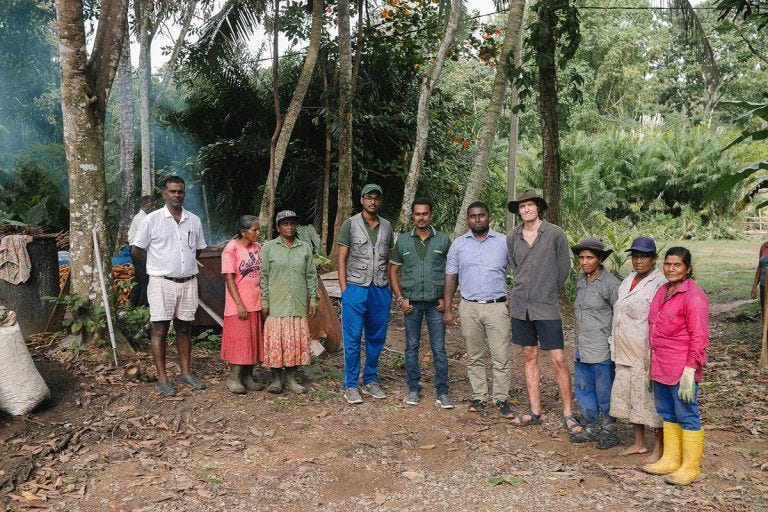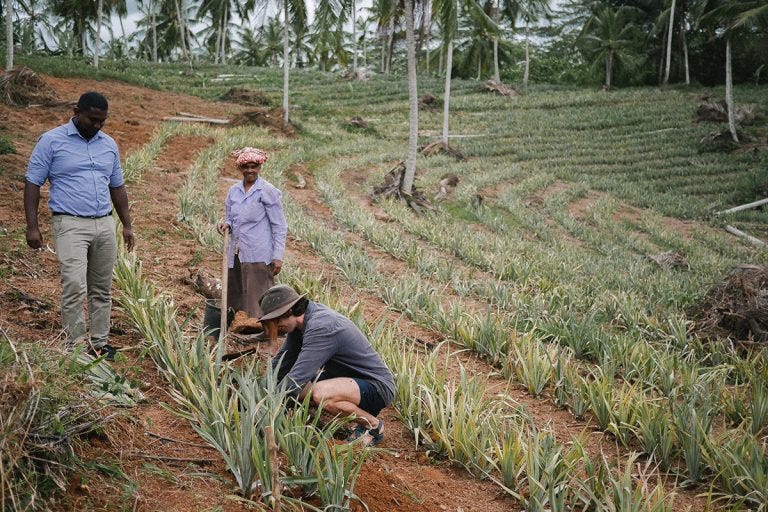💡Investment Notes: Why we invested in Planboo
Democratising high-quality biochar production, for soil regeneration, climate mitigation, and livelihood improvements
When researchers first uncovered the rich, dark earth known as Terra Preta, they realized something startling: these highly fertile soils might have been the result not of any natural process, but of human activity.
Discovered in otherwise infertile parts of the Amazon basin, these soils were co-located with remnant artifacts, and soon came to be understood as the product of supplementing the soil with biochar, stabilised carbon biomass created through burning at high temperatures. These soils were found to have high carbon contents of up to 150 g C/kg soil - at least a magnitude greater than in comparison to the surrounding soils with 20-30 g C/kg soil - and for much deeper depths than was usually associated with organic matter in the topsoil.
Biochar has been observed over a number of studies to offer yield benefits for a number of crops, although it doesn’t act in the same way that fertilisers do. Rather than directly providing nutrients to soil, the highly porous nature of biochar acts to facilitate the growth of beneficial microbes and soil biota, by providing large surface areas for them to live and grow.
Beyond the yield proposition, the original Terra Preta soils were found exciting for another reason. They’d been dated back to over 2,500 years ago implying that biochar, unlike the highly dynamic, unpyrolysed biomass that cycles through our food system (think food scraps and compost), is a highly stable form of carbon that can be effectively sequestered for centuries.
Rather than allow the waste from our agriculture and forestry systems, which require energy-intensive synthetic fertilisers to be produced, the biomass could be made into biochar, providing a simple, cost-effective climate mitigation solution that also restores life to soils. Specialty biochar carbon credits, such as that of the European Biochar certification, or on puro-earth have been sold to customers including Microsoft and Shell.
And so the biochar market has seen a staggering 25.92% CAGR from 2016 to 2023, expected to become an over $6B market by 2030.
But not all biochar is created equal. Despite efforts to make biochar production accessible to all, factors such as the type of biomass used and the temperature of burning play key roles in determining the quality of the biocha. This quality differential has led to most commercial biochar production and carbon sales becoming limited primarily to larger scale industrial users.
Knowing this is what made us excited about one of our latest investments, Planboo, a nature-based carbon removal company that provides agricultural companies and cooperatives with the tools, technology, and training they need to create biochar from bamboo and other plant waste. Their technology suite has been licensed in countries including Sri Lanka, Malawi, Thailand, and Namibia.
Here are three key reasons why we invested:
1. Democratizing high-quality biochar production, for livelihood improvements, soil restoration, and ecosystem regeneration.
By developing low-cost IoT data technologies that attach to kilns during biochar production, Planboo gives confidence in the quality of biochar produced, enabling greater adoption of the Artisan C-Sink biochar Standard.
This standard, supported by Carbon Standards International and European Biochar Certification, makes use of smaller, lower cost “Kon-Tiki” kilns. Planboo’s IoT devices are attached directly to kilns, collect real-time data on variables including cook temperature and duration, and send them to carbon registries as verification to model and issue carbon credit certifications. The data platform can also connect to other key stakeholders in the carbon ecosystem using APIs, to allow users to effortlessly share information with investors, credit rating agencies, insurers, and more.
Besides this, Planboo’s platform helps ensure that carbon projects are compliant by supporting users through the project documentation process.
The IoT devices are also paired with a Smartphone application which help guide producers through the optimal process of of creating biochar (for example, providing data-informed guidance on how much biomass should be added to the kiln), and also provides producers with the data they need to prove their case and access upfront financing for their kilns.
In this way, Planboo It opens up a market for $100+/ton CDRCs to middle and lower income regions, as well as access to self-generated soil fertilizer and nutrient boost. This increases farmers resilience and independence from large agrochemical companies.
Besides the agricultural benefit, the production of biochar, and sale of resultant carbon credits, can be used to combat encroaching or invasive species. For example, in one project in Namibia, they are making use of encroaching bush species, Acacia, to create biochar, which has been acknowledged as a significant challenge by the Namibian National Agricultural Policy as it contributes to desertification and environmental degredation.
2. Validation from recognised carbon standards, including the Carbon Standard International (CSI) and Puro.Earth.
In 2023 Planboo, together with Biochar Life, signed a collaboration agreement with Carbon Standards International, a standard and registry body which was founded in 2021 by the Ithaka Institute and the European Biochar Industry Consortium. The collaboration has enabled Planboo to be an official technology provider for projects under the European Biochar Certification (EBC). CSI’s confidence in Planboo’s work and technology is also shown by the fact that it has directed new projects interested in the standard to Planboo.
Planboo has also entered into a platform agreement with Puro Earth to list carbon credits on its registry. Before Puro Earth was established, Puro Standard was managed by the Standard Signatories, a group of 22 companies that managed and co-created the original standard since 2019. Puro Earth’s certification is ICROA-endorsed, meaning it is able to be transacted on ICROA-accredited marketplaces (e.g., Carbon Streaming, Wildlife Works, Climate Impact Partner, Ecosphere+, Ecoact, Vertree) and holds a higher perceived integrity by credit buyers.
3. Ability to rapidly grow supply ready to fulfil demand from the growing biochar market.
Planboo has so far proved to have a good network and a great intake of biochar projects. Since its inception in 2021, the company has secured 6 projects with contracted supply of over 50,000 tons of credits. Planboo’s partners have reported the hands on training and guidance, easy registration and set-up, and high relative prices as their incentive of working with Planboo.
What’s more, they’ve been able to generate carbon credits within 2.5 months, compared to the usual 6-12 months expected from artisanal biochar projects.
Planboo has also contracted with buyers to offtake their supply, and identified an opportunity of over 1.7B tonnes of biochar carbon in the Tropics. We’re excited to see them use their platform to meet this potential.
4. Clear pathway to financial growth and sustainability, with a combined licensing and profit-sharing model
Planboo’s B2B SaaS business model, which combines both technology licensing with a credit brokerage, helps support early cash flows while also benefiting from the longer-term growth of the market.
As impact investors, this pathway to financial sustainability is crucial to ensure that the company’s long-term impact can also be maintained.
Small holders and local communities can play pivotal roles in restoring and regenerating our landscapes, and interventions such as Planboo’s allows it them to be recognised and rewarded for their work. We’re proud at Silverstrand to be backing their work,
That’s all for this edition of our investment notes! If you’re interested to learn more about Planboo, visit their website, follow them on Linkedin, or reach out to their team (or ours) for more information.
If you enjoyed these notes, do share it with your network, and follow us for future updates - it means a lot to us!








